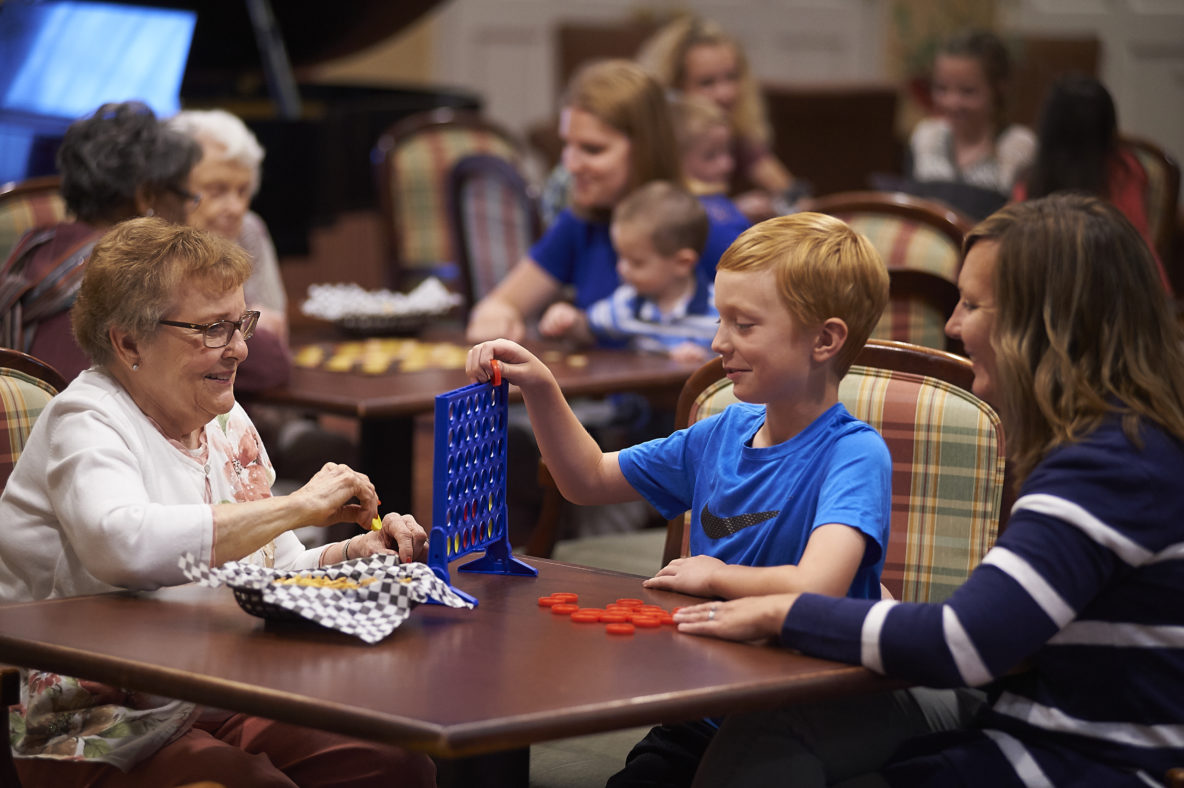According to the Alzheimer’s Association, more than 15 million family members serve as a caregiver to a loved one with Alzheimer’s disease or a different form of dementia. These unpaid caregivers often sacrifice their careers, finances and personal health in order to care for the well-being of those diagnosed with memory loss.
As a family caregiver, you want to do everything you can. But it’s important to remember that most cases of dementia eventually advance beyond the abilities of family caregivers, and professional, around-the-clock care becomes necessary. Memory care may be the best choice for a loved one—and offer important benefits for family caregivers as well.
Ways memory care can benefit family caregivers:
You can be a family again. Knowing that a loved one is safe, cared for and supported 24 hours a day frees you and your family to regain your roles as daughter, son, granddaughter and so on. Visits can be pleasant experiences that cheer your loved one and reassure you. You’ve been a family caregiver—now you can benefit knowing you are truly doing what is best for your Mom or Dad.
Your loved one is benefitting from specialized programs. Maybe the biggest positive impact of memory care for family caregivers is knowing the improved quality of life your loved one can experience. Research shows that keeping the mind active can slow down the progression of dementia. Memory care staff members are specially trained to offer programming that eliminates boredom and increases activity levels among residents who might otherwise have difficulty engaging.
You know your loved one is getting proper nutrition. For those with dementia, getting enough nutrients to stay healthy can be a struggle. Memory care communities ensure that residents are eating well and receive the appropriate amount of assistance they need during mealtimes. Special diets also can be accommodated.
You can be confident health services are right there. Scheduling visits with physicians, podiatrists, dentists and other medical professionals can be difficult for an adult child still working. In a memory care community, trained staff and nurses are right there, offering a huge peace-of-mind benefit for family caregivers. Plus, there’s usually a strong network of health professionals who make regular visits to the community.
You can rest assured rigorous safety protocols are in place. Today’s senior living communities are continuing to follow the highest standards for increased sanitation and disinfecting protocols. Policies for regular testing of staff and residents are in place. Visitation policies are constantly being evaluated to minimize risk. Vaccinations of residents and staff are well underway. Social distancing and limited interaction are incorporated into dining and activities as required. And remember, in a memory care setting, your loved one is in a secure environment, surrounded by a staff committed to the highest safety protocols, as opposed to being at home where controlling who comes and goes can be difficult to impossible.
You aren’t on call 24 hours a day. Most loved ones with memory loss eventually need full-time support. In a memory care setting, trained caregivers and nurses are on-site 24/7 to offer assistance. Your Mom or Dad isn’t waiting at home for a home health aide to provide support, or for you to come home from work to help keep them safe and comfortable.
Tips for transitioning to memory care.
- Check it out together. If possible, let your loved one visit the community in advance, perhaps enjoying a meal or even spending a few nights through respite care. Even if their memory doesn’t allow them to recall those events, it will help in developing relationships and a comfort level at the community
- Avoid anticipation anxiety. Wait until it is close to the moving date to tell your Mom or Dad they are moving. Consider positioning it as a limited period of time, such as a week. Then, it can stretch to two weeks or three weeks and eventually, it will be easier for your loved one to adjust to living there full time.
- Give your loved one time to adjust without you. Change can be difficult, and you don’t want to add confusion. Your Mom or Dad needs to be able to adjust to their surroundings, make friends, and become familiar with their caregivers. If you find it hard to stay away the first few days, talk to the staff instead and ask them what will work best.
Comfort and well-being are just the beginning.
At Senior Star Senior Living, we take a holistic approach to memory support that focuses on understanding and embracing each resident’s individual needs and abilities. We also can tell you more about the many memory care benefits for family caregivers. Contact us today → Want to learn more about planning for senior living? Download our Stay or Go Guide →


